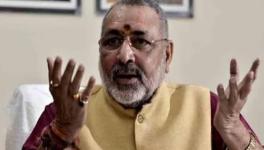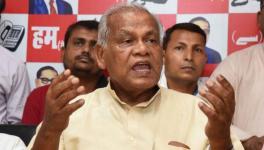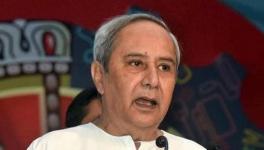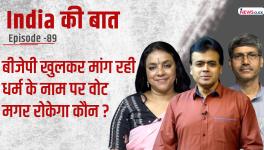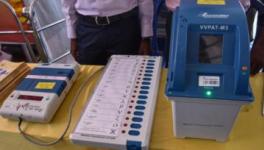Maharashtra: BJP Attempts Psychological Warfare
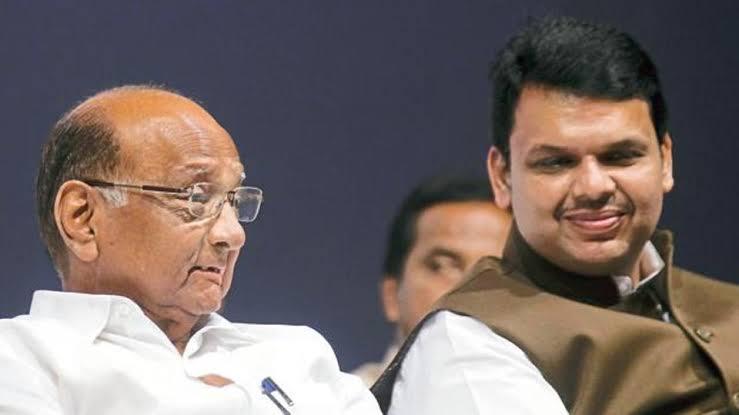
Whatever happened on Friday in Maharashtra will go down in history as the Bharatiya Janata Party’s desperate attempt to exert psychological pressure on the Opposition and crush their solidarity. The last word has not been written on this episode. The BJP does not seem—so far—to have the numbers it needs to form government. The Supreme Court has asked the Solicitor General to produce the [alleged] letters of support on the basis of which the BJP asked the Governor to invite Fadnavis to take the oath at 1030 AM on Monday.
But this episode has laid bare the fault lines in Indian politics: The regional forces, along with other formations, are attempting to create bulwarks against the BJP’s steam-rolling political rise. And the BJP wants to resist the regional assertion that is deeply embedded in today’s Opposition politics.
Ajit Pawar, nephew of Nationalist Congress Party (NCP) chief Sharad Pawar, was holding a crucial meeting late in the evening on Friday with top Opposition leaders on forming an alternative government in Maharashtra. Suddenly he left the venue and, on Saturday morning, it turned out that President’s Rule over the state had been revoked and the chief minister Devendra Fadnavis, had taken the oath to become Chief Minister again. Another shocker is that Ajit himself took charge as Deputy Chief Minister.
It is being said that Chhotey—meaning, junior—Pawar, as Ajit is known in Maharashtra political circles, had been in touch with leaders of the BJP for a long time, but their deal was finalised only on Friday night. The party had apparently hired two of its top leaders to carry out this operation. Why the BJP would indulge in these shenanigans is hardly being talked about, but needs explanation. First, at the national level, it does not want the Opposition parties to unite. Second, it also cannot countenance any of the regional parties in the National Democratic Alliance (NDA) gaining strength. In Maharashtra, both these concerns combined and started to weigh heavily on the BJP.
The primary goal of the NCP and Congress party was to keep the BJP out of power, and this framed their coalition talks. After the events of Friday, Sharad Pawar, in a press conference with the Shiv Sena, insisted that they will still form the government. His claim, whatever its immediate worth, should not be completely ignored. The BJP is undoubtedly going to struggle over the next few days to form a cabinet in Maharashtra and prove the salience of the letters it has procured, via Ajit Pawar.
In order to forge their tie-up, the Congress and the NCP were ready to neglect the ideological chasm that exists between them and also ignore the history of the Shiv Sena. The BJP knows all too well that if these three parties succeed in plans to wrest control of the state, there would have been a massive impact on national politics.
Second, the election campaign in Jharkhand has started, and the All Jharkhand Student Union (AJSU) has shown its hand: the united Opposition in the state has, at the moment, a clear upper hand over the BJP. Then, Bihar will head for elections in 2021. It is no secret that the fear of being engulfed by a powerful and expansive BJP has all Janata Dal (United) or JDU leaders in its grips. If the Shiv Sena has become a “younger brother” despite being very powerful in its home state, then the same can happen to the JDU.
Certainly, most regional parties lack ideological commitment, and go to any length to retain or gain power, but it is also true that they now face an existential threat. Their base is shrinking and there is very little for them to gain by participating in political play at the Centre as well. The kind of discomfort and suffocation that the Shiv Sena chief Uddhav Thackeray is feeling, is akin to what the Telugu Desam Party (TDP) chief Chandrababu Naidu has been feeling and expressing for several years now.
In Uttar Pradesh (UP), the Suheldev Bharatiya Samaj Party leader Om Prakash Rajbhar and in Bihar the Rashtriya Lok Samata Party leader Upendra Kushwaha, were surely experiencing the same pangs of survival and threat to their identity after they had tied up, in previous elections, with the BJP. No doubt, these parties found a solution in getting rid of the BJP. While living in the NDA, all such formations had become extremely weak and they are still struggling to regain their electoral territories.
It is a fact that the Apna Dal leaders are also uncomfortable with their alliance with the BJP, but at the moment they do not see any way out, because Prime Minister Narendra Modi at the Centre and Chief Minister Yogi Adityanath’s government in UP command a large majority. The Apna Dal is painfully aware of its irrelevance in the NDA.
No doubt, the tradition of changing leaders just before elections is old, but in the last six years, two interesting developments have come into public view quite emphatically. One, as elections approach, one or two Congress leaders of tall stature have switched to the BJP in almost every state. Be it Himanta Biswa Sarma of Assam, SM Krishna of Karnataka or Narayan Rane of Maharashtra and Radhakrishna Vikhe Patil or Kripa Shankar Singh. Leaders have also jumped, in bulk, from Mamata Banerjee’s Trinamool Congress (TMC) and into the BJP.
The second visible trend is that in most regional outfits, leadership and control has remained with people of a single family. Just before the last two Lok Sabha elections, there was a split in the family of Samajwadi Party chief Mulayam Singh Yadav and there was a fierce fight in the Chautala ruling family in Haryana. Now the results of these fratricidal battles are before all to see: The BJP has pushed aside regional forces, or taken advantage of the space vacated by them, to make headway into regions—and social groups—that it could never call its own earlier.
It is noteworthy that in the last six years, there have been many momentous changes and big ‘incidents’ in the country. The sort of intervention that was expected from Opposition parties was somehow not seen while these events unfolded, except in a few cases. Overall, the regional parties in particular, appeared weak and helpless, both inside and outside Parliament. On many important issues and Bills there was also mutual disagreement among the parties or their leaders. This is perhaps only to be expected.
Then came Maharashtra. After a long pause, a new political stir has started in the state. Maharashtra is a power centre in terms of its politics and its economic clout. There is no doubt that what will happen in the state will affect the politics of the entire country. The progressive crisis in the farms in this state is likely to have a bearing on all subsequent elections. This is why the ruling BJP wants to crush this effort of the Congress-Shiv Sena-NCP; to nip it right in the bud.
The BJP leadership is also aware that if the Opposition manages to form a government in a big state like Maharashtra, it may have an impact on the by-elections in Jharkhand Assembly and in Karnataka. That is why its operation in Maharashtra went along the lines of Goa and Karnataka. This is an attempt to exert a kind of psychological pressure on the Opposition, so that neither solidarity nor any voice can be raised in the future. The last word on this, as said, is yet to be written.
The writer is an independent journalist. The views are personal.
Get the latest reports & analysis with people's perspective on Protests, movements & deep analytical videos, discussions of the current affairs in your Telegram app. Subscribe to NewsClick's Telegram channel & get Real-Time updates on stories, as they get published on our website.










